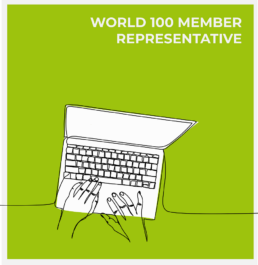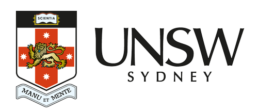
W100 Representative
Fiona DochertyVice President - External Engagement
Fiona Docherty is responsible for UNSW’s International, Marketing & Communications Service, which has been created to better support the realisation of UNSW’s strategy through stronger student recruitment, international partnership development, and global profiling activity. As Vice-President, External Relations Fiona leads this new and evolving service, supporting the President and Vice-Chancellor to deliver UNSW’s 2025 Strategic Plan and providing leadership across the following areas:
- Recruitment of future students to UNSW full degree and alliance programs, ensuring UNSW becomes ‘Australia’s Global University’ through the size and diversity of its student body
- Support for the development of a small number of strategic international partnerships which enhance our ability to address contemporary challenges and make a positive impact in Australia and around the world
- Strengthening of the University’s branding, communications, and marketing strategy, ensuring that UNSW’s mission and values are projected effectively, both locally and internationally, through PR and events.
In 2012, Fiona became Pro Vice-Chancellor, International at UNSW. Since then, UNSW has grown its international student community to 14,500; ranked first in Australia for graduating students with international experience; seen international student satisfaction rise above 90%, and joined two new international networks (GlobalTech Alliance and the Association of Pacific Rim Universities).
Graduating from the University of Glasgow in 1990, Fiona worked for arguably the UK’s most admired and progressive family business, Bettys & Taylors of Harrogate, becoming the company’s youngest director responsible for: corporate communications, sales, marketing, and community outreach programs in the UK and in countries like Ethiopia, India, and Brazil. Fiona was also a formative member of the UK’s Ethical Tea Partnership.

Established in 1949 with a unique focus on the scientific, technological and professional disciplines, University of New South Wales (UNSW) is a leading Australian university committed to making a difference through pioneering research and preparing the next generation of talented global citizens for career success.
University of New South Wales (UNSW) has a proud tradition of sustained innovation, focusing on areas critical to our future – from climate change and renewable energies to lifesaving medical treatments and breakthrough technologies. In the social sciences, UNSW research informs policy and expert commentary in key issues facing society ranging from human rights and constitutional recognition of Indigenous Australians to public health and population ageing.
UNSW offers an extensive range of undergraduate, postgraduate and research programs. We attract talented students from across Australia and around the world. Our 50,000-plus students come from 128 countries, making us one of Australia’s most cosmopolitan universities. Our emphasis on quality continues to push up entry standards with record demand from the State’s top school leavers.
The main UNSW campus is located on a 38 hectare site at Kensington, seven kilometres from the centre of Sydney. Other major campuses are Art & Design in Paddington and UNSW Canberra at the Australian Defence Force Academy.
The Latest from University of New South Wales
Yesterday, EU Energy Commissioner @KadriSimson and the Hon @BowenChris MP toured UNSW, including a visit to key energy R&D facilities in solar photovoltaics, green hydrogen and more.
We wrapped up the tour with a visit to the record-holding Sunswift Racing car! ☀️⚡️
💬 “It takes a certain amount of self-confidence to think, ‘Yeah, I might be wrong’ and ‘Why do I think that?’…”
UNSW A/Prof Michaelis Michael explains the markers of a bad faith argument – and how learning to argue better can make us better people.

How to have better arguments
A UNSW Sydney philosopher explains the markers of a bad faith argument and how learning to argue better can make us better people.
www.unsw.edu.au
Spot the difference 🔍
📸 UNSW Archives
When endangered species are seen struggling to survive it’s easy to assume they can be saved by giving them more of what they have now – but what if they could flourish with very different environments, foods and climates?

How palaeoconservation can rescue animals at the edge of existence
The distant past could provide clues to a species' immediate future.
www.unsw.edu.au
A fresh coat of rainbow must mean it’s @sydneymardigras season 🌈
Check out everything happening at UNSW throughout the festival 🔗 https://www.edi.unsw.edu.au/get-involved/mardi-gras
New UNSW modelling of Seoul, South Korea’s capital city, has shown that green roofs could cool the city by around 1°C during summer and slash the energy demand associated with cooling by almost 8% under maximum coverage.

Green roofs can cool cities and save energy: modelling
New research shows rooftop greenery coverage can help cool down a major city while reducing energy demand.
www.unsw.edu.au
🥹 Have you ever encountered something so adorable that you had an inexplicable urge to squeeze, crush or pinch it? You might have experienced the psychological phenomenon known as cute aggression.

Cute aggression: why you might want to squash every adorable thing you see
If too cute is simply too much for us to handle, our minds can do a strange thing.
www.unsw.edu.au
🌊 A group of marine scientists are embarking on a mission to restore the waters of the iconic Sydney Harbour.
If successful, it may become a template for revitalising other urban marine sites worldwide.

Inside the mission to restore the waters of Sydney Harbour
Scientists are working to bring balance back to Sydney‘s iconic waterway. If successful, it may become a template ...
news.unsw.edu.au
🧧🐉 Happy Lunar New Year! May the Year of the Dragon bring you good luck and fortune.
UNSW Vice-Chancellor and President, Professor Attila Brungs rings in the new year with a special message to everyone across our community.
UNSW have more top ratings in broad fields of research (Excellence in Research for Australia 2018) and more impact cases rated high (2018 EI Assessment) than any other Australian university
UNSW has 19,095 online course enrolments
In 1958, the University name was changed from The New South Wales University of Technology to the University of New South Wales, and in 1960 it broadened its scholarly, student base and character with the establishment of a Faculty of Arts, soon to be followed, in 1960, by Medicine then in 1971 by Law
We are a powerhouse of cutting-edgeresearch, teaching and innovation
UNSW Australia is a founding member of the Group of Eight – a coalition of Australia’s leading research-intensive universities – and the prestigious Universitas 21 international network. We are the only Australian member of the Global Alliance of Technological Universities; a member of the Association of Pacific Rim Universities (APRU); and a partner of Coursera, the largest provider of MOOCs in the world. With internationally recognised and award-winning academic staff, we have an impressive standing in global league tables, achieving our highest ratings for research, innovation and facilities.
Mission and vision
- To be a world-class, world-changing university.
- To bring inspiring people together and create a world-class environment for learning and research, empowering staff and students alike to discover and share knowledge that can change the world.
Ranked in the top 1% of world universities
4,485
Higher degree research students
$550m
Annual research income
University of New South Wales (UNSW) has a strong reputation for research excellence. Through this excellence, the focus is on continuing to increase UNSW’s research contribution both regionally and globally.
At UNSW Sydney we are passionate about research, changing lives and achieving global impacts.
We strive to meet tomorrow’s challenges and are an acknowledged world leader in photovoltaics, HIV/AIDS research and quantum computing.
Our strengths:
- Biomedical sciences
- Water, climate, environment and sustainability
- Next generation materials and technologies
- Social policy, government and health policy
- ICT, robotics and devices
- Law, business and economics
- Fundamental and enabling sciences
- Contemporary humanities and creative arts
- Defence and security
Become a Member
The World 100 Reputation Network is a group of the best universities in the world, delivering research that enhances reputation and offering leaders the chance to develop their own careers on a global stage. Members benefit from events and study tours, training, monthly media monitoring, and unique reputation research to provide institutional advantage.


